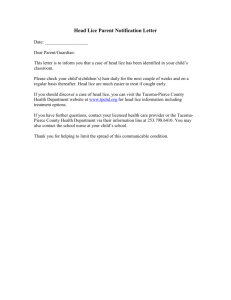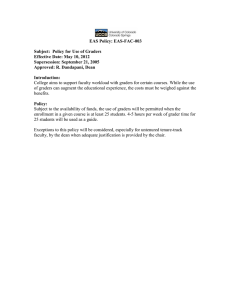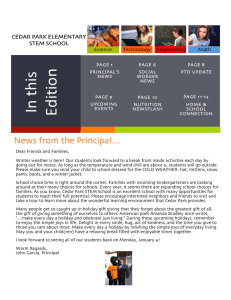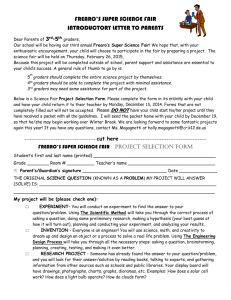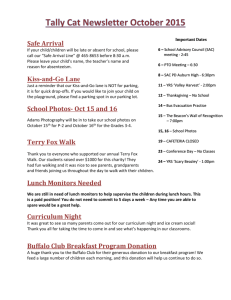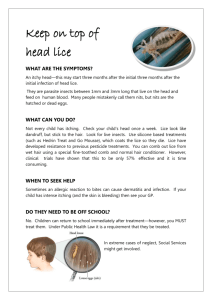Document 10832286
advertisement
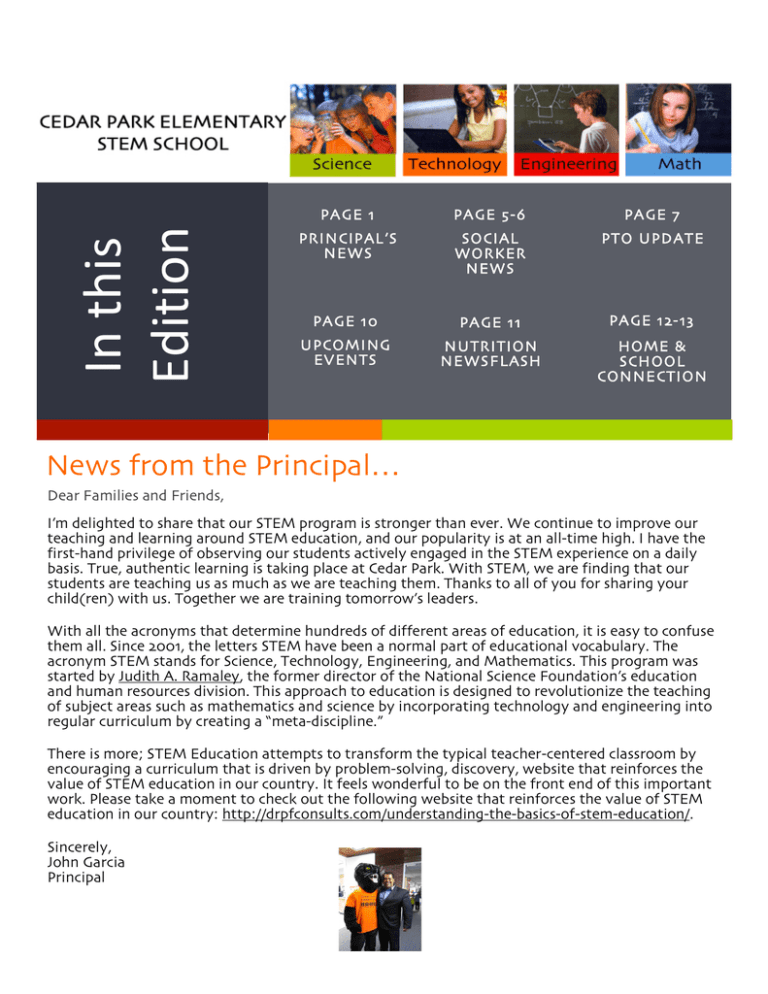
In this Edition \ PAGE 1 PAGE 5 -6 PAGE 7 PRINCIPAL’S NEWS SOCIAL WORKER NEWS PTO UPDATE PAGE 10 PAGE 11 PAGE 12-13 UPCOMING EVENTS NUTRITION NEWSFLASH HOME & SCHOOL CONNECTION News from the Principal… Dear Families and Friends, I’m delighted to share that our STEM program is stronger than ever. We continue to improve our teaching and learning around STEM education, and our popularity is at an all-time high. I have the first-hand privilege of observing our students actively engaged in the STEM experience on a daily basis. True, authentic learning is taking place at Cedar Park. With STEM, we are finding that our students are teaching us as much as we are teaching them. Thanks to all of you for sharing your child(ren) with us. Together we are training tomorrow’s leaders. With all the acronyms that determine hundreds of different areas of education, it is easy to confuse them all. Since 2001, the letters STEM have been a normal part of educational vocabulary. The acronym STEM stands for Science, Technology, Engineering, and Mathematics. This program was started by Judith A. Ramaley, the former director of the National Science Foundation’s education and human resources division. This approach to education is designed to revolutionize the teaching of subject areas such as mathematics and science by incorporating technology and engineering into regular curriculum by creating a “meta-discipline.” There is more; STEM Education attempts to transform the typical teacher-centered classroom by encouraging a curriculum that is driven by problem-solving, discovery, website that reinforces the value of STEM education in our country. It feels wonderful to be on the front end of this important work. Please take a moment to check out the following website that reinforces the value of STEM education in our country: http://drpfconsults.com/understanding-the-basics-of-stem-education/. Sincerely, John Garcia Principal Family Engineering Night Cedar Park STEM offered our families a fun night of engineering on Thursday, January 21st, with our Family Engineering Night! Families explored engineering concepts as they participated in engineering design challenges. They had a great time launching parachutes, tinkering with the concept of buoyancy and building boats, and investigating Makey-Makeys! The University of Minnesota’s Department of Chemical Engineering and Materials Science Exclusive Tour for Cedar Park and Echo Park Families On Saturday, January 16th, two busloads of families from Cedar Park and Echo Park went to the University of Minnesota to learn about the exciting cutting edge engineering and science that the UMN is creating. They toured different labs (biology, materials characterization, and microscopy), participated in demonstrations given by UMN engineers and scientists, and received a “Making STUFF” bag to take home. A great time was had by all who attended! Technology News from Mr. Staum Below is what each grade level has been learning in Technology Class this winter: Kindergarten Kindergarteners have been practicing their counting skills (with a focus on 'teen numbers) in a variety of websites such as ABCya and Starfall. These websites can be used at home as well. Students also enjoyed exploring counting activities in Kidspiration in the computer lab. 1st grade First graders really dug into "all things penguins" the past month in tech class. Students started off researching the different types of penguins on PebbleGo.org and chose a penguin they wanted to do a report on. Each student also each used the Google Earth app in the computer lab to travel to Antarctica to do a "penguin scavenger hunt" where they found penguins, scientists, research facilities, and camps as well as many other wildlife including seals, whales, dolphins, etc. First graders ended their penguin tech adventure by creating a "My Penguin" report in Comic Life in tech class that parents will have the opportunity to see at conferences. 2nd grade Second graders have completed one of the coolest, most innovative units yet: Force & Friction with Sphero robots. Each class had three Sphero lessons in the Engineering Room where Mr. Staum led students in exploring their science unit themes of force, friction, and load. Each student got to see how speed, distance, and direction affects force with Spheros. Students used different friction covers and speed settings to find out how much force is need to send Spheros up a ramp. Students also used our Sphero chariots in groups to explore how hauling a load of woodblocks affects Spheros and its force settings as well. 3rd Grade Third graders are working hard on creating a non-fiction animal report in Comic Life. Students are researching and choosing a Minnesota native animal to center this project on. In the lab with their teachers and Mr. Staum, students brought in images and typed paragraphs of detailed information into their report templates. When these reports are finished, each class and student will receive a copy, along with Lebanon Hills Regional Park for our community to see! Currently, third graders are exploring sound with GarageBand in tech class with Mr. Staum. 4th Grade Fourth graders have researched their heritage from interviewing family members to using online educational resources and are creating an informational visual project called "My Heritage." Students will soon be posting their digital projects to our school secured Tech Google Classroom. Then by using proper digital citizenship and netiquette, classmates will comment, compliment, and ask respectful inquiries about each other’s heritage and what makes their peers (and world) so unique and special. Fourth graders will soon be creating online book reports in our ISD 196 Google Apps portal. 5th Grade Fifth graders have been working hard on applying their knowledge of cyberbullying and netiquette in creating an online "Anti-Cyberbullying" poster via our ISD 196 Google Apps portal. Fifth graders know they are the leaders of our school and are helping create awareness with their younger peers and staff about this serious topic. They will be hanging their anti-cyberbullying posters in their classrooms, and Mr. Staum will choose one or two posters per class to hang up in the lab and halls for all to see. Fifth graders will soon be creating an online Slides presentation on digital citizenship in our ISD 196 Google Apps portal as well. Social Worker News Children and Sleep An average child gets one hour less of sleep today than children did 30 years ago. A survey from the National Sleep Foundation found that 90% of parents believe their children get enough sleep, but in reality 60% of students report extreme sleepiness during the day. Dr. Sadeh of Tel Aviv University did a study of 4th and 6th graders. For three consecutive evenings half of the 4th graders and half of the 6th graders were told to go to bed 30 minutes earlier than normal; the remaining were told to stay awake 30 minutes later than normal. When tested on the fourth day, students who had gotten less sleep, showed a performance gap of two years behind where they scored before the study. Sleep helps kids shift what is learned during the day to more efficient parts of the brain. One other study reported high school students who received A’s averaged about 15 minutes more sleep than B students. They in turn averaged 15 more minutes of sleep than C students. Besides lower grades, lack of sleep can also lead to weight gain, and irritable moods. Any parent knows that fact. How much sleep do they need? • • • • • • • 1 – 4 weeks old, 15 to 16 hours per day 1 – 4 months, 14 to 15 hours per day 4 – 12 months, 14 to 15 hours per day 1 – 3 years old, 12 to 14 hours per day 3 – 6 years old, 10 to 12 hours per day 7 – 12 years old, 10 to 11 hours per day 12 – 18 years old, 8 to 9 hours per day What better reason to send the kids to bed and have some quiet adult time? Sleep tight; you need it too! Social Worker News (continued) New 2016 State of MN Supervision Criteria From Dakota County Social Services Lack of Supervision • • • • • Children age 7 and under who are left alone for any period of time Children ages 8 – 10 who are left alone for more than 3 hours Children ages 11 – 13 who are left alone for more than 12 hours Children ages 14 – 15 who are left alone for more than 24 hours Children ages 16 – 17 may be left alone for more than 24 hours with a plan in place concerning how to respond to an emergency Babysitting • • Children under age 11 should not provide child care • Children age 16 – 17 may be left alone for more than 24 hours with adequate adult back up supervision Children ages 11 – 15 who are placed in the child care role are subject to the same time restrictions of being left alone as listed above Pennies for Patients Thank you so much for your generosity!! We raised $1,000.00!!! We are so thankful for our wonderful families and the support you have shown!! I am in school Monday – Friday from 8:00 a.m. to 4:00 p.m. If you have questions or concerns, feel free to stop in, give me a call, or send and email. My confidential voice mail is 651-683-6969, ext. 18795. My direct line is 952-431-8795, and my email is diane.johnson@district196.org. Diane Johnson, Cedar Park STEM Social Worker J Culver’s Community Day We would like to thank the staff and families who supported our January Culver’s Community Day! In January, we received a check for $103.09. Many thanks to Ms. Durnin, Mrs. Knutson, Mrs. Roth, and Mrs. Van Guilder for delivering food to tables. Our February Culver’s Day is on Monday, February 8th. Mr. Hartzheim and Ms. Ernst will be delivering food to tables from 5:00-6:00 p.m. Mr. Fritz will deliver food to tables from 6:00-7:00 p.m. The flavor of the day is Heath Chocolate Almond. Please remember to say you are from Cedar Park, so we receive 15% of your purchase. We appreciate your support of our Culver’s Community Days!!! Winter has definitely set in, but that doesn’t mean the PTO is hibernating. In fact, we are busier than ever planning fun events for the whole family! The next Scholastic Book Fair is coming soon! Stop by and check out the groovy selection of books, posters, pencils, and more during February conferences: Tuesday, February 9th 4:00-8:00 p.m. & Thursday, February 11th 12:00-8:00 p.m. And just around the corner is the next PTO Family Night! Round up the kids and come play BINGO in the school gym on Friday, March 4th from 6:00-7:30 p.m. Play to win posters, Water Park of America passes, gift cards, school t-shirts, and more! Just $1 gets you a BINGO board and a bag of popcorn. The PTO is proud to partner with Cedar Park staff to plan the School of Excellence Celebration week, May 16-20th. Many fabulous events are in the planning stages, including Celebration Family Night, which will take the place of the Carnival during the evening on Friday, May 20th. Look for lots of information (and requests for help!) during the months ahead!! To offset costs for Celebration Week, PTO is holding an additional fundraiser. Students have already received the Chip Shoppe product catalog and order forms. Friends and family can order directly from you or online with your student’s sales number. All paper order forms need to be returned to school by February 8th; online orders need to be completed by February 8th, but nothing needs to be turned in to the school. Product pick-up will be March 3rd from 3:00-6:00 p.m. in the school gym. December’s spirit night at SmashBurger, was a great success, raising $216.00 for the school. And January’s Chick-fil-A night raised $226.00 for the school, too. Thank you for helping raise money for Cedar Park! This month the PTO continued its mission to support Cedar Park financially: - $113.45 for Nancy Carlson and Shelia O’Connor books (I Love to Read Night & author visits) - $153.34 to replace some library books in disrepair If you are interested in sharing your ideas or helping with one of the many PTO family events, please join us at our next meeting! See you then!! Upcoming PTO Dates: February 8 February 8 February 9 & 11 February 23 March 3 March 4 March 14 **April 21 **May 20 Chip Shoppe orders due PTO Meeting (library) 6:30-8:00 p.m. Scholastic Book Fair (during conferences) Smashburger School Spirit Night 4:00-8:00 p.m. Chip Shoppe product pick up (gym) 3:00-6:00 p.m. BINGO Night (gym) 6:00-7:30 p.m. PTO Meeting (library) 6:30-8:00 p.m. Buy-1-Get-1 Scholastic Book Fair at STEM Family Night School of Excellence Celebration Family Night **changes from the 2015-16 school calendar For more information, visit our website at cedarparkpto.digitalpto.com or follow the link on the homepage of the school’s website. Music Notes Gym Shorts Cedar Park was filled with the sound of drums during the month of January. Students in grades K-5 tried their hand at drumming during music classes! We have many talented percussionists in our midst! Third graders enjoyed a trip to Macalaster to hear an African Drumming Ensemble. Your children have been working really hard at increasing their physical fitness levels by participating in many different cooperation games and activities over the past month. We will keep working on that component as well as reminding them to continually eat healthy meals and snacks. Fourth graders are practicing recorders in order to achieve recorder karate belts. The Recorder Recital will be at 10:00 a.m. on March 16. Third graders are preparing for their upcoming program, A World of Music, on March 17 at 2:30 p.m. and 6:30 p.m. For 5th grade Parents: Please be thinking about helping as a volunteer for the 5th Grade Track Meet. It will be held at Apple Valley High School on May 9th and the alternate date would be May 16th if the weather doesn't cooperate on May 9th. There will be a letter coming home soon with your 5th grader in their Friday folders. Heartbeat Chorus is now in session during after school classes. The combined choirs will perform at Cedar Park on March 18 at 9:45 a.m. Mrs. Ploeger Music Specialist Mrs. Douglas/Mr. Hartzheim Physical Education Specialists GRASP Parents, it’s time to start thinking about summer and how you’ll help your children keep their math and reading skills sharp. Many of you know that the GRASP workbook program, available through Community Education, is one way to help your children during the summer. However, GRASP should not be considered as a replacement for participating in summer school, if a child qualifies. This year, GRASP registration information will be sent home with students February 16-19. Sample workbooks will be available for review in the school office during parent/teacher conferences and the registration period. The deadline for registration this year is March 29. Watch for more information later this winter. Band Notes Fourth graders will be attending the Apple Valley High School Wind Ensemble Concert on March 4th at 10:00 a.m. at Apple Valley High School. They will be able to see and hear many different instruments at this exciting concert. Shortly after that in March, the 4th graders will get to choose their band instrument for 5th grade. Mrs. Firchow will help each student select his/her "just right" instrument. The students will get their instruments at their first lesson. Most students will begin lessons in the summer on July 25th or July 26th. A few students will begin lessons in September. Check out Mrs. Firchow's moodle page for lots of BAND INFORMATION. (http://learn.district196.org/course/view.php ?id=3303) Anja Firchow Band Specialist Head Lice Education Dear Parent or Guardian: Community head lice cases have been on the rise. An estimated 6 to 12 million infestations occur each year in the United States, most commonly among children ages 3 to 11. So, I am writing to you to help you learn how to identify lice and provide information on what you can do if lice hits your home. What are head lice? Head lice are tiny, wingless insects that live close to the human scalp. They feed on blood. The eggs, also called nits, are tiny, tear-drop shaped eggs that attach to the hair shaft. Nits often appear yellowish or white, and can look like dandruff but cannot be removed or brushed off. The nymph, or baby louse, is smaller and grow to adult size in one to two weeks. The adult louse is the size of a sesame seed appears tan to grayish-white. An itchy and inflamed scalp is a common symptom of lice. Although not common, persistent scratching may lead to skin irritation and even infection. Who is affected by head lice? Head lice are not related to cleanliness. In fact, head lice often infest people with good hygiene and grooming habits. Infestations can occur at home, school or in the community. Head lice are mostly spread by direct head-to-head contact—for example, during play at home or school, slumber parties, sports activities, or camp. Less often, lice are spread via objects that have been in recent contact with a person with head lice, such as hats, scarves, hair ribbons, combs, brushes, stuffed animals or bedding. What to do if an infestation occurs? If you think your child has head lice, it’s important to talk to a healthcare provider to discuss the best treatment approach for your family. Resistance to some over-the-counter head lice treatments has been reported, but the prevalence of resistance is not known. There are new prescription treatment options available that are safe and do not require nit combing. Head lice are not an infectious disease but are a tremendous nuisance. The district website, www.district196.org/headlice, contains updated information about preventing, detecting and treating head lice. As your school nurse, I want to provide you with the information you need to safeguard your children’s health. I hope you find this information useful. Sincerely, Mrs. Tousignant Cedar Park School Nurse UPCOMING EVENTS EVENTS UPCOMING Thursday, February 4th Site Council Meeting – 5:00-6:00 p.m. Monday, February 8th Culver’s Community Day PTO Meeting – 6:30-8:00 p.m. NO AFTER SCHOOL CLASSES Tuesday, February 9th Kindergarten Registration – 8:00 a.m.-8:00 p.m. Conferences – 4:00-8:00 p.m. Scholastic Book Fair – 4:00-8:00 p.m. NO AFTER SCHOOL CLASSES Thursday, February 11th Kindergarten Registration – 8:00 a.m.-8:00 p.m. Conferences – 4:00-8:00 p.m. Scholastic Book Fair – 4:00-8:00 p.m. NO SCHOOL Friday, February 12th NO SCHOOL Monday, February 15th NO SCHOOL – President’s Day Friday, February 19th 2nd Grade Field Study to Lebanon Hills – Benson, Klinger, Youngberg – 9:45 a.m.-12:30 p.m. Kienholz & Tompkins – 1:00-3:30 p.m. 4th Grade Field Study to the Science Museum of MN – 9:45 a.m.-3:15 p.m. Thursday, February 23rd I Love to Read Night – 6:30-8:00 p.m. Nutrition News Flash February 2016 Rosemount-Apple Valley-Eagan Public Schools 0 , Founded in Owatonna, MN in 1990 Elementary Italian Dunkers Sliced Tomato Choc. Chip Cookie Fresh Veggies Bushel Boy tomatoes are vine ripened for full flavor. They are picked red, ripe, juicy and on the vine then shipped to your store within a couple of days. Local Lunch Middle Asian Chicken or Fish Sandwich Sliced Tomato Cowboy Caviar Top 10 Things to Know about the 2015-2020 Dietary Guidelines for Americans Pollinated by happy bumblebees. Maintaining the perfect climate in the greenhouse helps to conserve water. All tomatoes that are not quite up to Bushel Boy standards are donated to local food shelves twice a week. This helps to reduce waste and provides fresh produce to those in need. www.bushelboy.com . 1. A lifetime of healthy eating helps to prevent chronic diseases like obesity, heart disease, high blood pressure and Type 2 diabetes. 2. Healthy eating is one of the most powerful tools to reduce the onset of disease. 3. A healthy eating pattern can improve health. 4. A healthy eating pattern includes: A variety of vegetables; Fruits, especially whole fruit; Grains, at least half of which are whole grain; Fat-free or low-fat dairy; A variety of protein foods; Oils, including those from plants, and 5. Healthy eating patterns limit added sugars. Less than 10% of your daily calories should come from added sugars. 6. Healthy eating patterns limit saturated and trans fats. Foods high in saturated fat include butter, whole milk, meats that are not labeled lean, tropical oils such as coconut and palm oil. 7. Limit sodium intake to less than 2,300mg per day. 8. Make small shifts in daily eating habits to improve health over the long run. 9. Regular physical activity is one of the most important things you can do to improve your health. 10. Everyone has a role – at home, school, workplace, community, and food retail outlets encouraging easy, accessible and affordable ways to support healthy choices. www.gov/news/dietary-guidelines Lunchroom Joke Corner Ketchup. What did the father tomato say to the baby tomato while on a family walk?? Check out the Food and Nutrition home page for upto-date information regarding dates and times. www.district196.org select Meals on the left side. Reminders for All Students and Parents: Breakfast is FREE for all kindergarten students and students who qualify for FREE or REDUCED-price school meals. Lunch is FREE for all students who qualify for FREE or REDUCED-price school meals. Please try breakfast at your school. A nutritious breakfast is an important start to a child’s school day! Parents/Guardians: FeePay has the option for you to set a low-balance reminder via email. We don’t just serve breakfast and lunch……..we serve students! High School Chicken Drumsticks Fish Sandwich Sliced Tomato Fresh Veggies Monday, July 11 through Thursday, August 11 at Cedar Park Echo Park Oak Ridge This institution is an equal opportunity provider. Employment opportunities within Nutrition Services are available. Home&School Working Together for School Success February 2016 CONNECTION ® Cedar Park STEM School Mr. John Garcia, Principal SHORT NOTES Groundhog Day When was the first Groundhog Day? How often is the groundhog right about the weather? Encourage your child to find the answers to these questions and more by researching Groundhog Day in library books or online. Then, she can make her own predictions about when spring weather will arrive—and see if she and the groundhog agree! Illustrate a feeling Drawing or painting a picture is often an easier way for youngsters to express difficult feelings. If you sense that your child feels nervous, sad, or afraid, try getting out art supplies. He might sketch a portrait of himself with butterflies across his stomach if he’s nervous or a scary monster if he’s afraid. Family workouts On cold winter days, your youngster can still get the 60 minutes of recommended daily physical activity— while enjoying family time. Play “baseball” with snowballs, scoring one run for each ball you hit. Build an indoor or outdoor obstacle course. Or hold “yoga class” by following a video. Worth quoting “You can’t stay in your corner of the forest waiting for others to come to you. You have to go to them sometimes.” A. A. Milne JUST FOR FUN Read, create, and retell In school, your child will be asked to think deeply about books and to pay close attention to details as he reads. That means doing activities like analyzing characters, visualizing book settings, and retelling stories. Let him practice at home with these fun projects. Character cereal Have your youngster cover an empty cereal box with paper and decorate it based on his favorite storybook character. For example, The Rainbow Fish (Marcus Pfister) learns to be a good friend, so your youngster could name his cereal “Friendly Flakes.” Encourage him to draw the character on his box and describe the cereal (“Sparkly and colorful”). He could add an activity on the back, such as a quiz. (“Why did the other fish ignore him at first?”) Setting map Suggest that your child draw a map of a book’s setting. He’ll imagine what the setting might look like and think about how each part is important to the story. If he’s mapping Holes (Louis Sachar), he could use a circle to represent Camp Green Lake, where the prisoners dig holes. He can add an onion for the field where onions grow and are used as medicine. Plot bag Let your youngster fill a paper bag with items related to a story and use them to retell the tale aloud. After he reads A Chair for My Mother (Vera B. Williams), he might put a fabric swatch and coins in a bag. He can pull out each piece and explain its significance as he retells. (“I added coins because the kids saved money to buy their mom a chair. She worked hard and needed a place to relax.”)♥ School pride If your youngster takes pride in her school, she’s likely to feel more connected to it— and more motivated to learn. Help her develop strong school ties with these tips: Q: What musical instrument can you hear but not see or touch? ● Make school events into family events by attend- A: Your voice! ● Post school news and announcements on the refrigerator. Providing a place of ing as many as you can. Your child will feel proud to show off her school to you. honor for these items reminds her that school is an important part of your family’s life. ● Encourage your youngster to get involved in a school activity. Being a member of the chess club or safety patrol squad will give her a sense of pride—and of belonging.♥ © 2015 Resources for Educators, a division of CCH Incorporated Home & School CONNECTION February 2016 • Page 2 ® A respectful student School is more pleasant for both students and teachers when children behave respectfully. Share this advice with your youngster so she can do her part in creating a respectful place to learn. Respect for all. Point out that everyone — from the principal to the custodian, and from the popular kid to the unpopular one—deserves to be treated with respect. Encourage your child to smile or wave at school staff members and fellow students. You can set an example by letting her see you give everyone (receptionists and doctors, cashiers and store managers) the same respect. ACTIVITY CORNER Junk-drawer creativity Look no further than your kitchen junk drawer to give your youngster’s creative thinking a boost. Try these ideas. Reuse Suggest that your child come up with different uses for objects in the drawer. He could use rubber bands to make a ball or turn a cork into a pincushion, for example. Take turns thinking of ways to reuse a bottle cap, a handheld mirror, and other junk-drawer items. Sort Let your youngster sort items according to a secret criterion, and you try to figure out his rule. Say he puts a paper clip and a key in one group, and a coupon and a gift bag in another. You might guess that he’s sorting by materials (metal, paper). Next, you sort objects into piles, and have him determine your rule.♥ O U R P U R P O S E To provide busy parents with practical ideas that promote school success, parent involvement, and more effective parenting. Resources for Educators, a division of CCH Incorporated 128 N. Royal Avenue • Front Royal, VA 22630 540-636-4280 • rfecustomer@wolterskluwer.com www.rfeonline.com ISSN 1540-5621 © 2015 Resources for Educators, a division of CCH Incorporated Respect for property. In school, students share library books, playground space, restrooms, and more. And these things will be nicer to use when youngsters take care of them. Suggest that your child do simple acts that show respect for school property. Examples: Returning library books so others can read them, putting trash in wastebaskets so the playground and restrooms look nice and stay clean.♥ Q Strong study habits & My third grader has to spend more A Q: time studying this year. How can I make sure he studies effectively? A: Set your son up for success by helping him find a distraction-free study spot. Also, have him come up with a study routine. and notes For instance, he could reserve time each evening to review his textbook quiz. or test a to up leading days the in Then, many students find it helpful to jot down a purpose each time they the boldstudy at home. Your child might write: “I will learn the definitions of all 1.” section 7, chapter in faced words works Finally, encourage him to experiment with study strategies to find what draw a or spelled is word a how imagine and best for him. He could close his eyes math recite or spell to easier it find might he Or 3. x 3 solve to grid with 9 squares tune.♥ familiar a to or rhythm in aloud facts PARENT TO R PA ENT Perfect…or close enough My daughter Sasha gets upset if her handwriting isn’t “perfect” or if her shoes aren’t tied a certain way. My mother pointed out that I’m kind of a perfectionist, too. While it helped me work hard in school and now at my job, she said it often led to frustration when I was Sasha’s age. She suggested that I try what worked with me: Have Sasha think about what might happen if something isn’t perfect. So the next time I found my daughter retying her laces over and over, I asked, “What’s the worst that could happen if the knot is a little offcenter?” At first she said she would trip and fall, but then she smiled and said, “I guess nothing.” Another day, she wanted to rip up her homework because every letter wasn’t perfect. I encouraged her to do a different assignment and look at the first one again later— she did, and she decided she could live with it after all. Sasha may always be a perfectionist, but I hope she’s learning to tell the difference between what really matters and what she can let go.♥
